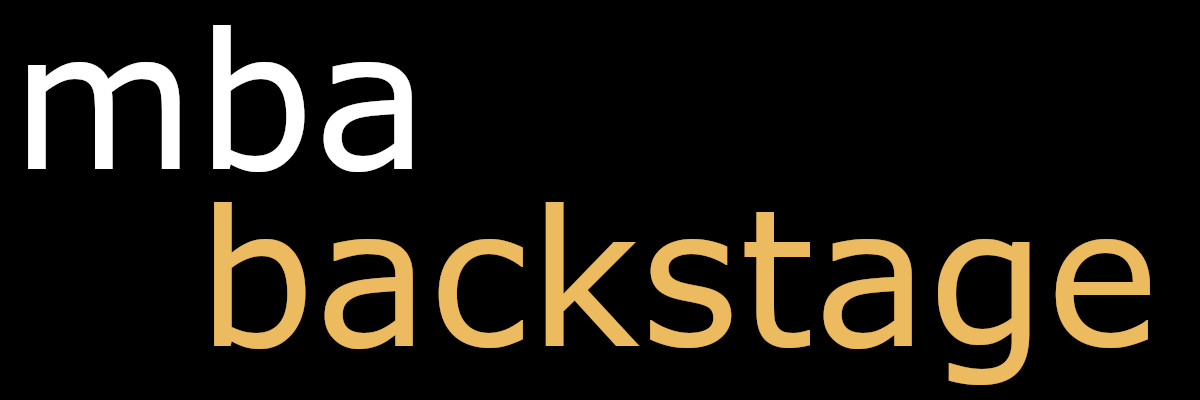Interview Tips

Just in case you’re wondering, your interview will probably not look like the picture above, but we thought it looked cooler than a couple of people in suits staring at each other 😉
The purpose of the interview
Schools include an interview for several reasons:
- Check that you are the person your application claims.
- Check your communication / presentation skills and that you have the potential to do well in a post-MBA interview.
- Check any remaining doubts about your application (if the interview is not “blind”).
- Check your cultural fit with the business school (and your maturity for younger candidates).
Interviews are often run by alumni given that they are better placed to assess cultural fit, career aspirations and post-MBA employability.
Be aware of your specific school interview philosophy
Nowadays most schools require you to interview in order to get admitted. In case you don’t know it, schools can follow two different types of interview strategies:
- Open interviews (all candidates have the opportunity to interview, Kellogg and Tuck being two famous examples).
- Invite only interviews (only candidates who get past a screening filter are invited to interview).
Should you spontaneously ask for an interview if the school has an Open Interview philosophy? In most cases booking an interview pro-actively demonstrates your interest and dedication to the school, but your strategy should also depend on where your strengths and weaknesses lie:
– If you feel like you are a strong candidate “on paper” (good test scores, lots of examples to demonstrate soft skills, etc.) but “selling yourself” in an interview setting is not one of your best qualities, then getting them to read a solid written application first can put you in a position of strength when the interview invite arrives (as long as it’s not blind*). The interviewer will start with a positive impression and focus on the remaining boxes the school needs to tick, limiting the risk of you running out of time to make your case.
*blind interview: the interviewer does not have access to your essays and only has your CV as background information.
– If you feel that you have some holes in your application “on paper” and / or you are a strong communicator then perhaps getting the interview out of the way early can allow you to make an impression and tackle head-on some of your weaknesses.
What to expect?
Interviews with alumni are generally quite informal. The school will typically connect the applicant and alumni and it will be up to them to meet and carry out the interview within a certain time frame (usually a few weeks).
The venue can be the school, the interviewer’s office, or a quiet public meeting point such as a hotel. Be pro-active in suggesting a location to your advantage. Cafes are best avoided since they can be noisy and you will likely be distracted / interrupted. Getting the alumnus out of his / her work environment is also key to get them to focus fully on the present matter, so avoid his / her office. Most of all, avoid a phone / Skype interview at all costs as it will be harder to do well in.
Alumni interviews will vary in structure. They will all receive guidelines to follow, but depending on their character / experience they may choose to just have a chat about pretty much anything, such as your pet anaconda for example (we recommend to not mention him). An informal chat may make you relax but can be a double edged sword as you want to be sure you have conveyed all the right messages by the time interview ends (see below).
School led interviews are more structured and formal. They usually happen on campus.
“The problem with most interview preparations is that people spend the majority of their time preparing in a structured way for something that is fundamentally unstructured”
The fundamental mistake most applicants make…
For most schools if you’re at the interview stage, it means you have a good change of getting accepted (50%+ in most cases). The issue is that there’s a fair amount of luck involved in this last stage, given that you have 1-2 hours to convey weeks / months of preparation, and on top of that interviews are fundamentally unpredictable. Why? Because…
- You’ll know very little about your interviewer in terms of their personality, priorities, likes, dislikes, etc.
- Interviews are often the last step in the process that schools use to fill in the gaps on your application. The problem is you don’t know in advance what they’ll want to focus the interview on. This is especially true with alumni interviews who may not even follow the school guidelines.
Even if you prepare for 50-100 questions (that would cover most scenarios) you don’t know which 10-15 will come up on the D-Day and you’ll have no idea in what order they will arrive, meaning that you will have to adapt your answers to what you have already said, be forced to use backup examples to avoid repeating previous ones and may end up missing out some of the key messages / points you wanted to convey.
Many candidates prepare for an interview by writing down answers to a list of most-common questions. They may then have 2-3 practice interviews with friends / colleagues / consultants. The problem with this common approach is that you’ll spend the majority of your time preparing in a structured way for something that is fundamentally unpredictable / unstructured.
Our recommended step by step approach
1. Prepare some bullet-point answers for a range of standard questions (we’ll cover these in a later article) but then aim to spend the majority of your preparation time talking. You don’t need to do all of this in front of a mock-interview partner, a mirror will do the trick.
2. Make a “question generator”. Could be as simple as a bag with pieces of paper in it. The main objective is to practice answering questions that don’t always come in the same order. That way you can practice referring to your previous answers and building on them in a concise and natural way. It will also force you to have several examples for each SAR question in case you use one of the examples up in a previous question.
3. Make a list of the 10-15 key points you want to convey during the interview. It could include 3 references to the school to show your interest, 3 demonstrations of leadership, etc.
4. Do a mock-interview of 10 random questions in front of the mirror (maybe always start with a warm up question such as “walk me through your CV” or “why do you want to join us”). Also try to fit in some obvious follow-up questions that could come up. Stop the interview after 60mins even if you haven’t covered all the questions (if you haven’t, it probably means you’re not being concise enough).
5. At the end of the interview check whether you addressed all your 10-15 key points. If not, think about where you could have slotted them in.
6. Interview-assess-repeat. Go to 4. and repeat until all your mock-interviews flow naturally and you can hit all the points without fault each time.
We know it can be incredibly hard for some people, but using a camera to record the interview is even better for checking body language, intonation, pauses, etc. Make sure you also practice at least once or twice with a living being (a human, not your pet snake) to get their feedback.
You may be thinking this is an overkill, but if you really want to maximise your chances of getting your dream school, this extra preparation make flip the coin in your favour by allowing you to put in a confident, natural performance in the interview. It may even be the difference between an admission and an admission + scholarship. Boom $$$.
The other stuff…
Work on your body language. Looking confident and open-minded will help you feel that way (and vice-versa). Read up on this and practice in front of the mirror.
For dress code, just like for any interview (except maybe for one of those wacky creatives jobs) best to not take any risks. Assume business attire is required unless stated otherwise and stick with safe colours. You’ll have plenty of chances to show off your fancy-dress skills during the MBA.
If you’re interview is with an alumnus think about how they are likely to be dressed. If it’s during the week then there’s a very high chance they will be coming from work and dressed formally. If it’s on the weekend business casual should be fine, but as they say it’s always better to look more dressed up than the opposite.
What about sending a thank you note? Many applicants find these cheesy (or a sign of trying too hard) and that certainly can be true, but again our advice is to rather be safe than sorry. Send a quick and simple thank you note to your interviewer. To make it seem more natural you can refer to something that came up in the conversation (e.g. include a link to a company/article that you mentioned). A great candidate will already have made a mental note during the interview of a couple of things that could be included in the thank you note. Avoid making it too long (a few sentences should be fine). Chances are the interviewer won’t have the time to read your 1-pager of personal insights on the South East Asian Edtec private equity scene 😉

0 Comments